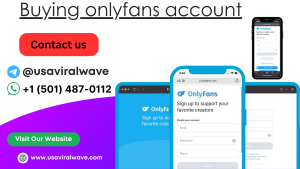The Ethics of Buying OnlyFans Accounts—Does It Cross the Line?
In the rapidly expanding digital economy, OnlyFans has emerged as a powerful platform for creators to monetize content and build loyal communities. Alongside its growth, however, has come a controversial trend: buying and selling OnlyFans accounts. While this may seem like a quick path to success for aspiring entrepreneurs, it raises complex ethical, legal, and social questions that deserve careful examination.
✅✅✅✅✅✅✅✅✅✅✅
More information, please contact me
Email: usaviralwave@gmail.com
Telegram: @usaviralwave
WhatsApp: +1 (501) 487-0112
✅✅✅✅✅✅✅✅✅✅✅

Understanding the Practice of Buying OnlyFans Accounts
When we talk about purchasing an OnlyFans account, we are referring to the transfer of an established profile—complete with followers, branding, and sometimes even pre-existing content. Buyers see this as a shortcut, skipping the slow and often challenging process of building an audience from scratch.
At its core, the practice involves:
Acquiring the username, fan base, and content library of a creator.
Rebranding or continuing the existing identity for profit.
Leveraging existing subscriber relationships to generate revenue.
While this seems like a clever business strategy, the reality is far more complicated.
The Ethical Dilemma: Authenticity vs. Profit
One of the central ethical questions is authenticity. Subscribers typically join an OnlyFans account because of a personal connection with the creator. They invest not only in content but also in the persona and trust that the creator has built.
When accounts change hands, these subscribers are often kept in the dark. What they thought was genuine interaction may become a deceptive continuation under new ownership. From an ethical standpoint, this undermines the very foundation of creator-fan relationships.

Key ethical concerns include:
Deception: Misleading fans who believe they are still interacting with the original creator.
Exploitation: Profiting from the trust and work of someone else without transparency.
Consent: Subscribers have no say in whether their subscription continues under new management.
Legal Implications of Buying and Selling OnlyFans Accounts
Beyond ethics, there are legal implications tied to this practice. According to OnlyFans’ terms of service, accounts are non-transferable. This means that the act of selling or buying an account directly violates platform policies.
Potential risks include:
Permanent account suspension by OnlyFans if detected.
Loss of revenue and subscribers when accounts are shut down.
Possible legal disputes over ownership of content, images, and intellectual property.
Engaging in such activities can result not only in financial losses but also in damage to one’s reputation within the online creator economy.
Impact on the Creator Economy
The creator economy thrives on transparency, trust, and individuality. The practice of buying accounts disrupts these principles. If fans begin to suspect that creators are interchangeable and their loyalty can be sold, the entire foundation of fan engagement could weaken.
For example:
Creators who build their accounts authentically may struggle to compete with artificially inflated profiles.
Fans may lose trust in the platform as a whole, questioning whether their favorite creators are genuine.
Platforms risk reputational harm if such practices become widespread and unchecked.
This ripple effect highlights why the ethical debate is not just about individual transactions but about the integrity of the ecosystem itself.
Psychological Effects on Subscribers
Subscribers join OnlyFans for a personalized experience. Many feel a sense of intimacy or direct connection with the creator. Discovering that an account has been sold can lead to feelings of betrayal, manipulation, and loss of trust.
These effects extend beyond the platform itself, influencing how users view online relationships in general. The erosion of trust can have a lasting impact on the reputation of digital creators across platforms.
The Business Temptation: Why People Buy Accounts
Despite the risks, the allure of buying OnlyFans accounts persists. For entrepreneurs, it represents:
Instant audience access without months or years of growth.
Monetization shortcuts by inheriting paying subscribers.
Reduced marketing costs since the account already has visibility.
However, these benefits often prove short-lived, as fans quickly notice changes in tone, interaction style, and content quality. This leads to churn and cancellations, leaving buyers with little long-term value.

Ethical Alternatives to Buying Accounts
Instead of engaging in ethically questionable practices, aspiring OnlyFans creators can focus on sustainable, authentic growth strategies.
1. Building a Genuine Brand
Create a unique identity, voice, and content niche that resonates with audiences. Authenticity fosters long-term loyalty.
2. Leveraging Social Media Promotion
Use platforms like Twitter, TikTok, or Reddit to drive organic traffic and attract the right subscribers.
3. Collaborating with Other Creators
Partnerships allow for audience sharing without compromising integrity.
4. Offering Value Beyond Content
Providing personalized interactions, behind-the-scenes access, or exclusive perks strengthens the creator-fan bond.
These approaches may take more time but establish a solid, trustworthy foundation that cannot be replicated through account purchases.
Moral Responsibility of Buyers and Sellers
Both buyers and sellers bear responsibility in this equation.
Sellers: By monetizing their audience relationships, they may betray the trust of loyal fans.
Buyers: By perpetuating this practice, they fuel an ecosystem of deception and exploitation.
Ethical responsibility lies in acknowledging that audiences are not just numbers—they are real people who deserve transparency.
Does It Cross the Line?
When examining the issue holistically, it becomes clear that buying OnlyFans accounts does cross an ethical line. The practice involves deception, risks violating laws and platform policies, and undermines the foundation of trust that the creator economy relies on.
While the business temptation is understandable, the long-term damage far outweighs the short-term gains. For creators and entrepreneurs alike, the most sustainable path lies in authentic growth, transparency, and ethical business practices.
Conclusion
The rise of buying and selling OnlyFans accounts reflects the challenges of a fast-growing digital creator economy. Yet, as appealing as shortcuts may be, they compromise trust, authenticity, and integrity—all of which are vital for long-term success.
As responsible participants in the digital space, we must prioritize ethical practices that strengthen the bond between creators and audiences, rather than undermine it. Only then can platforms like OnlyFans continue to thrive as trusted spaces for creativity and connection.
 :
https://www.pinterest.com/usaviralwave/
:
https://www.pinterest.com/usaviralwave/

